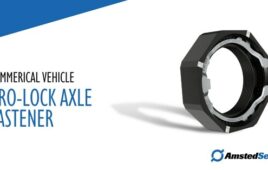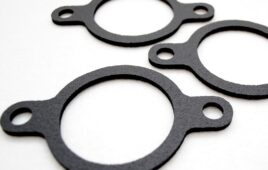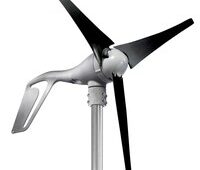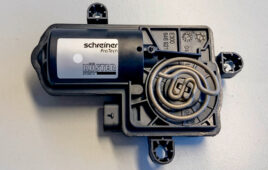By Paul J. Heney, Editorial Director
How does a company sustain itself in a green fashion through decades of changing business demands? According to Dr. Ted Duclos, VP and general manager of the Global Fluid Power Div. of Freudenberg-NOK Sealing Technologies, this complex question has what amounts to a clear answer.
Duclos, who spoke recently at the Center for Automotive Research Management Briefing Seminar in Traverse City, Mich., said that corporate sustainability requires businesses to equally address economic, environmental and social issues—a complex task. However, businesses can manage this complexity by establishing clear principles that drive innovation, continuous improvement, financial accountability, customer and employee consensus, and community support. In short, sustainable knowledge that will drive success.

Dr. Ted Duclos, VP and general manager of Freudenberg-NOK Sealing Technologies’ Fluid Power Division (left) and Roy Schroeder, Lead Center manager, Fluid Power, Automotive, look over a new single cavity press installed at the company’s Findlay, Ohio facility.
“Anyone in business understands that in order for a business to survive and prosper, it must have the capacity to endure, persevere through business cycles and pursue long-range objectives,” Duclos said. “The ability to endure in business, of course, requires sound finances, relevant products and an effective means of production. Sustainability is about more than checking a box. It must be founded on the ability to develop new techniques, innovations and knowledge. It is a distillation of the capabilities needed to survive in an evolving business arena.”
Freudenberg-NOK’s guiding principles, drafted by the company’s founder, Carl Freudenberg, in 1887, are still in use today. The six guidelines are: Value for customer, responsibility, innovation, leadership, people and long-term orientation. The company says these provide a framework for how it does business and embodies the very definition of sustainability.
“The guiding principles drive innovation, waste reduction, fiscal conservatism, collaboration and long-term thinking—all crucial to corporate sustainability,” Duclos said. “While new business developments, increased global product demands, environmental concerns and economic fluctuations have challenged the company, the guiding principles have ensured its survival.”
Achieving sustainability through these Principles sounds good in theory, but from a practical standpoint, the company has several examples of how it uses the guidelines to drive knowledge creation and longevity:
- The company’s Energy Saving Seals (ESS) reduce friction and heat to such an extent that if every seal on a vehicle (that could be replaced with an ESS) were replaced, it would save the equivalent of three days of oil imports in the United States;
- The “Net Shape Single Cavity Mold Process” is a counter-intuitive approach to manufacturing because it produces a finished part in the mold; it improves quality, eliminates waste because there is no trimming or scrap created during production, improves time to market, and lowers inventory requirements; and
- The TANNER (Travel and Navigate New Exciting Roads) program has sent more than 800 students abroad to experience different countries and cultures.
Freudenberg-NOK
www.fnst.com





Excellent article, concisely written. I think at this point an important question would be: can these new innovative ideas be retrofitted in current cars? What’s the price, and does it pay off (environmentally and fiscally)?